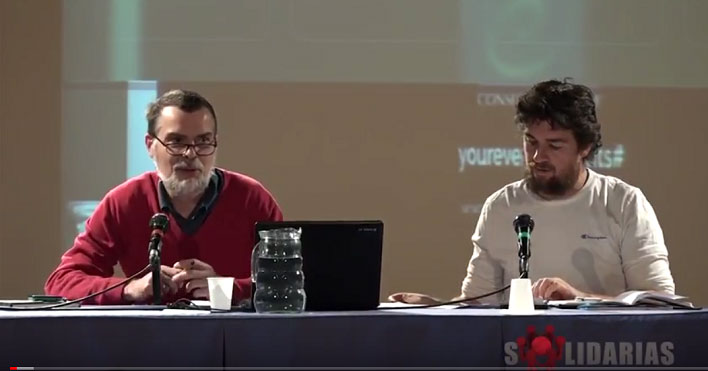Using the European Social Charter to Defend Social Rights

ATD Fourth World members in Spain marked Human Rights Day with an event entitled “Social Rights: the Poor Relatives of Human Rights?” The day brought together several organisations for training and discussion on how the European Social Charter can be used to defend against human rights violations in Spain and elsewhere. Organised in collaboration with the national anti-poverty movement Marea Bàsica, the exchange took place at the Galileo Social Center in Madrid on 10 December. Speakers on the day offered experience and insight on several topics concerning the Charter: using the Collective Complaints Procedure, advocacy by civil society organisations and mobilising for campaigns, possibilities for legal recourse, and the Spanish Parliament’s recent ratification of the European Social Charter.
A Treaty to be Respected
Attendees on the day agreed: social policies have been under pressure in Europe for many years. The financial and economic crisis of 2008 caused countries to reduce their budgets, and such budget cuts have also affected people’s social protections. And even beyond the crisis, intolerable and unjust situations persist. How do we deal with this and make the necessary changes to guarantee everyone a decent life?
The European Social Charter can and should be an effective response to the above question. Professor of Human Rights at the University of Valencia, Carmen Salcedo Beltran, notes, “Even if its name does not clearly indicate it, [the European Social Charter] is nevertheless a human rights treaty that must be respected by the states which signed it.”
For example, Greece decided to lower its minimum wage for workers under the age of 25 and increased their trial period to one year: it was challenged by the European Council for disrespecting the European Social Charter. In Spain, many of the country’s regions have insufficient minimum income schemes. Since 1996, the European Committee of Social Rights has repeatedly concluded that Spain is disrespecting Article 13 (1) of the Social Charter.
Social Pressure Towards Legal Changes
Despite their binding nature, the decisions made by the European Committee on Social Rights are not always sufficient to change legislation. Nevertheless, serious social problems are recognised and characterised as a denial of fundamental human rights on the international public scene, and it possible to draw on this in a court of law.
“Nowadays, in the European context, it is increasingly difficult to see clearly what serves as a real reference for social rights. In 2000, the European Union adopted the Charter of Fundamental Rights, and in November 2017, it adopted the European Pillar of Social Rights. “All of this is useful”, says Bert Luyts, who represents ATD Fourth World at the European Union, “but let us not forget that the European Social Charter [of 1961] remains the very foundation of social rights!”
Concrete Examples in Court
Speakers at the 10 December event provided two examples to demonstrate how the European Social Charter has already proven effective in pressing for the rights of people living in poverty to be respected:
-In January 2006, ATD Fourth World filed a collective complaint against France because several individuals and families living in poverty were not given access to social housing, or were only granted it after extremely long periods of time. Following examinations and hearings in December 2007, the European Committee of Social Rights confirmed that France was violating the Charter’s Article 13, in regards to housing, and Article 30, on protection against poverty. This collective complaint certainly sped up France’s adoption of the 2007 law on the enforceable right to housing.
-In 2014, the International Federation of Human Rights (FIDH) rallied members for a collective complaint against Ireland. The claim denounced the squalor and persistent indecent state of some of the country’s social housing estates. The European Committee of Social Rights concluded that Ireland was not respecting Article 16, “The right of the family to social, legal and economic protection” of the European Social Charter. Although it is too early to judge whether the government is taking measures to improve the state of social housing, the European Committee’s conclusion is significant for the tenants. It has finally been recognised that the landlords and the state are largely to blame for the country’s poor housing conditions.
Another Collective Victory
Participants at the Human Rights Day event learned that the above examples effectively used the Collective Complaints Procedure. This Procedure was set up to render more effective the revised European Social Charter (the Charter was signed in 1961 and revised in 1996). It allows social partners and authorised international NGOs to question when a state is not implementing the Charter and to push the states to make legislative and policy changes. In these cases, reviewing the countries’ reports on their implementation of the Charter can also result in binding recommendations.
However, in those countries that have not ratified the revised European Social Charter, this Procedure is not valid. Thus Spain has been asked since 1996 to improve its minimum income system. Recently, a group of associations,* of which ATD Fourth World is a member, encouraged the use of the Charter in administrative tribunals in cases involving the minimum income system. This same group asked the government to ratify the revised Social Charter and the Collective Complaints Procedure. On 23 November 2017, a motion in favour of this ratification was passed unanimously in Spain’s Congress of Deputies. On Human Rights Day some two weeks later, this small victory and the collective campaign that led to it were cause for both celebration and study for continued action.
* Many thanks to ATD’s partners: Caritas Spain, EAPN-Spain (European Anti-Poverty Network – Spain), and Third Sector Impact.
Additional information about ATD Fourth World’s work with European institutions.

